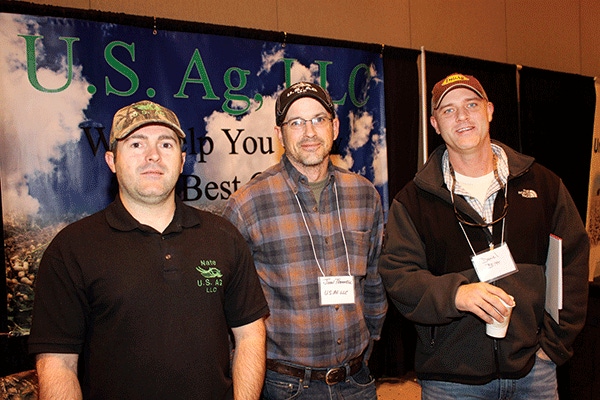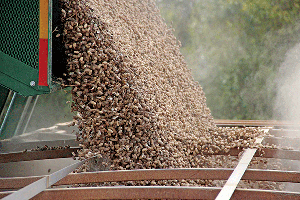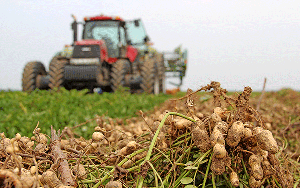
Grower participation in politics vital for peanuts and ag, lobbyist says
“The political contribution process has become more important over the last 10 years," says Bob Redding, lobbyist for peanut organizations in Mississippi, Alabama, Georgia, and Florida. "And making those contributions through a PAC is critical. We have to be better toward investing in programs that are important to us."

Farmers need to become more involved in the political process if they want to continue to have meaningful government farm programs, says Bob Redding, The Redding Firm, Washington, D.C.
“If we don’t get more engaged, we’re not going to be able to keep these programs,” he told members of the Mississippi Peanut Growers Association at their annual meeting. “We simply don’t have enough people.

BOB REDDING
“When I started representing peanuts in Washington, there were about 25,000 producers in Georgia alone. Now, there are maybe 3,500 — a dramatic drop. There are still a lot of acres, and huge production, but we don’t have the grower numbers.”
Contributions to political action committees (PACs) are important, says Redding, who is lobbyist for peanut organizations in Mississippi, Alabama, Georgia, and Florida.
“The political contribution process has become more important over the last 10 years, and making those contributions through a PAC is critical. We have to be better toward investing in programs that are important to us.
“There are those who ask, ‘Why do we even do this — it’s too complicated?’ But when you look at the baseline that’s going to our industry, you can see it has increased dramatically, and that’s important.”
In the 2014 election cycle, Redding says, agriculture’s contributions to PACs amounted to about $25 million, of which $8 million was from production sectors. Sugar PACs received more than $4 million in contributions, cotton $500,000, rice $250,000, and peanuts $130,000 (or $300,000 if contributions from buying points and shellers are included).
“By pooling money from growers, buying points, and shellers, we’re able to put together a really good team effort on behalf of the peanut industry,” he says.
Stay current on what’s happening in Mid-South agriculture: Subscribe to Delta Farm Press Daily
Under the banner of the Southern Peanut Farmers Federation, Redding says, “We’ve had a coalition in place for several years that has been quite effective. We work well together and have similar views — not just about peanuts, but about agriculture in general.
“We’re very proud of this. I recall the days when we didn’t have this kind of organization, and we sent mixed messages on Capitol Hill. It was very frustrating period for us.”
Peanuts have a strong support base
Peanuts have “a strong support base, particularly in the South,” he says, “but with direct payments under so much fire” during debate on the 2014 farm bill,” we talked with our leaders about options, and we came up with the program that you have now. Our grower leaders have told us they’re very pleased with it. We feel good about it now. We just need to let it run its course.”
Now, Redding says, the challenge is to bring growers up to speed on program provisions. “Extension, USDA, and grower organizations in all four states have worked hard to educate growers about this bill and our new peanut revenue program.”
Peanuts were part of “a strong coalition in Washington” during the farm bill discussions, he says. “Cotton, rice, peanuts, and sugar worked closely together on whip counts in the House and Senate committees, as well as on the floor.”
But, he says, “If we had to try and pass a farm bill in the 114th Congress this year or next year, it would be very difficult to get the 218 votes needed on a strictly Republican vote. We’d have to have some Democrat votes, and that would be hard.
“As the House has shifted more to the Republican party, getting Democrat support has become much harder in the Senate and House. We still have a few Democrats in the House, and they bring with them a coalition of others from rural areas that are involved in other issues. Where we’re short in our Republican base, we work hard to get the needed 218 votes.”
Redding says Mike Conaway, R-Texas, the new chairman of the House Agriculture Committee, “is a strong supporter of agriculture, and has been a rock star for peanuts. Not one time has he let us down on advocacy from the floor, when we needed leadership in the House, or with USDA.
“And we have a number of senior members on the committee on the Republican side who have a peanut constituency. We don’t look for a lot of changes there. Rick Crawford, R-Ark., the new chairman of the Commodities and Risk Management Subcommittee, is a really good team player for agriculture. Collin Peterson, D-Minn., ranking minority member, has been on the Ag Committee for a long time, loves agriculture, likes peanuts, and has been very helpful to us.
“To say that Thad Cochran, R-Miss., saved us in the last farm bill would be an understatement. We had a Senate bill we couldn’t support; it was an awful bill for peanuts. Sen. Cochran fixed it — he couldn’t have been more helpful. Now that he’s chairman of the full Appropriations Committee, he can be of tremendous value to us.”
Key goal: More peanut exports
Going forward, Redding says, “Trade is going to be very important to us. The House Ways and Means Subcommittee on Trade is where the action is going to be over the next two years. We sell a lot of peanuts in the U.S., but we’ve got to do a better job of exporting them. We’re really focusing on this — it’s going to be a big deal for us.
“Our group and Southern Peanut Farmers Federation are working closely with American Peanut Council on a trade agenda, and we’ll be able to push that once action really starts on trade discussions.”
Top issues in 114th Congress, Redding says, include immigration reform, the Fiscal Year 2016 appropriations bill, repeal of Obamacare, and energy.
Among priorities for 2015, he says, are to “protect what we have in 2014 farm bill; keep an eye on regulations and how provisions of the farm law are implemented; prepare for the 2018 farm bill; and boosting trade and exports.
A concern, Redding says, is “the significant drop in this administration’s government peanut butter purchases. We need to get this corrected. The peak was in the early 1990s, and then it began dropping. We’re hoping Sen. Cochran and others will be able to help us start turning this around.”
“In preparation for the 2018 farm bill, he says, the Southern Peanut Farmers Federation will start listening sessions in Mississippi, Alabama, Georgia, and Florida in 2016. “These will be town hall-type meetings, listening to growers, hearing what they feel works, what doesn’t, what we want to keep. In 2017, Congressional field hearings will start, at least on the House side, and Capitol Hill hearings.
“Our goals in this process are to identify our supporters, support our key congressional advocates, increase our PAC contributions, participate in the listening and town hall sessions, and then decide what we want to do in the next farm bill.
About the Author(s)
You May Also Like



